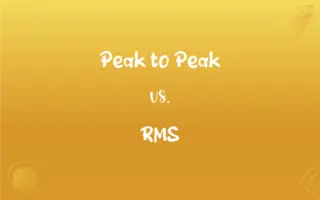Measure vs. Procedure: What's the Difference?
Edited by Janet White || By Harlon Moss || Updated on November 3, 2023
Measure refers to a method of assessing or the dimensions taken, while a procedure is a series of actions for a specific purpose.

Key Differences
A measure is an assessment or a quantifiable observation used to determine the size, amount, or degree of something. This can involve tools such as rulers or scales, or be an abstract concept such as a legislative measure. On the other hand, a procedure is a set of established ways to carry out a task or process. It implies a sequence of steps or actions taken to achieve a particular end.
When a measure is implemented, it is often a singular and specific action, such as measuring the length of a table. In contrast, a procedure would encompass all the steps to assemble the table, which could include measuring as one of its components. Therefore, measures are components that could be part of a broader procedure.
In the medical field, a measure might refer to the dosage of medicine given to a patient, which is determined by specific metrics such as weight or age. Conversely, the procedure would include the comprehensive approach to treating the patient, which involves diagnostics, the administration of the medicine, and follow-up.
In business, a measure could refer to performance indicators such as sales figures or customer satisfaction scores. A procedure, however, would be the method by which these sales are made or how customer service is provided, indicating the systematic approach to achieving these measures.
Measures can be thought of as the units or tools for quantification, like liters, meters, or degrees. Procedures, though, relate to the methodologies or protocols, like scientific methods, surgical techniques, or recipes in cooking, which guide how these measures are used and applied in various fields.
ADVERTISEMENT
Comparison Chart
Definition
A unit or standard of measurement.
A series of actions conducted in a certain order.
Purpose
To quantify or determine the extent of something.
To accomplish a task or solve a problem.
Nature
Often a single action or quantifiable attribute.
A sequence of actions or steps.
Scope
Specific and focused on dimensions.
Broad and encompassing a process.
Implementation
Can be a one-time action.
Usually involves multiple actions or measures.
ADVERTISEMENT
Measure and Procedure Definitions
Measure
A planned action determined by particular needs or conditions.
The company took drastic measures to cut costs.
Procedure
A detailed plan of a scientific experiment.
The procedure was carefully followed to ensure accurate results.
Measure
A legislative bill or resolution proposed or passed by a legislative body.
The senate passed a measure to increase funding for education.
Procedure
An official way of doing something, often in business or law.
The company's grievance procedure is outlined in the handbook.
Measure
A standard unit used to express the size, length, or amount of something.
The room's dimensions were a key measure for the new carpet.
Procedure
A way of doing something, especially a systematic way.
The procedure for evacuating the building was in the safety manual.
Measure
The extent, dimension, or amount of something.
The success of the policy was hard to measure.
Procedure
A series of actions conducted by a surgeon.
The cardiac procedure saved his life.
Measure
The grouping of beats in a piece of music.
He struggled to keep time with the measure in the complex symphony.
Procedure
A series of coded software instructions to perform a specific task.
The computer executed the procedure to reboot the system.
Measure
A reference standard or sample used for the quantitative comparison of properties
The standard kilogram is maintained as a measure of mass.
Procedure
A manner of proceeding; a way of performing or effecting something
Standard procedure.
FAQs
Is measure used in music?
Yes, it refers to rhythmic divisions in a composition.
Are there measures for time?
Yes, like seconds, minutes, and hours.
Can procedures change over time?
Yes, procedures can evolve with new information or technology.
Do procedures have to be written down?
They are often documented to ensure consistency, but not always.
Can measure be used in a non-physical sense?
Yes, it can also refer to an extent or degree of an action.
Is a procedure always medical?
No, procedures apply to any systematic method of doing things.
Can anyone create a procedure?
Yes, but effective ones are usually developed by experts.
Do measures require tools?
Often, yes, such as rulers or scales, but not always.
Are procedures universal?
Some are, but many are specific to cultures or industries.
Are measures always exact?
They aim to be, but can sometimes be estimations.
What does it mean to take measures?
It means to take action or make a plan to achieve something.
Are procedures only for complex tasks?
No, they can be for simple tasks as well.
Is a recipe a type of procedure?
Yes, it's a procedure for preparing food.
Are safety drills a procedure?
Yes, they are procedures for safety preparedness.
Do all procedures involve multiple people?
No, some can be carried out by an individual.
Is measure used in law?
Yes, referring to a proposed law or statute.
Can measures be preventative?
Yes, like measures taken to prevent disease.
Are procedures necessary in research?
Yes, they are critical for replicability and validity.
Can a measure be subjective?
Some measures, like pain scales, have subjective elements.
How does one measure success?
Success can be measured by various metrics, depending on goals.
About Author
Written by
Harlon MossHarlon is a seasoned quality moderator and accomplished content writer for Difference Wiki. An alumnus of the prestigious University of California, he earned his degree in Computer Science. Leveraging his academic background, Harlon brings a meticulous and informed perspective to his work, ensuring content accuracy and excellence.
Edited by
Janet WhiteJanet White has been an esteemed writer and blogger for Difference Wiki. Holding a Master's degree in Science and Medical Journalism from the prestigious Boston University, she has consistently demonstrated her expertise and passion for her field. When she's not immersed in her work, Janet relishes her time exercising, delving into a good book, and cherishing moments with friends and family.








































































